

 The Accurate Reloading Forums
The Accurate Reloading Forums  THE ACCURATE RELOADING.COM FORUMS
THE ACCURATE RELOADING.COM FORUMS  Hunting
Hunting  African Big Game Hunting
African Big Game Hunting  AFRICAN DG CARTRIDGES: The .375 H&H came after the forerunner .375/404 Jeffery
AFRICAN DG CARTRIDGES: The .375 H&H came after the forerunner .375/404 JefferyGo  | New  | Find  | Notify  | Tools  | Reply  |  |
| one of us |
From this most excellent book:  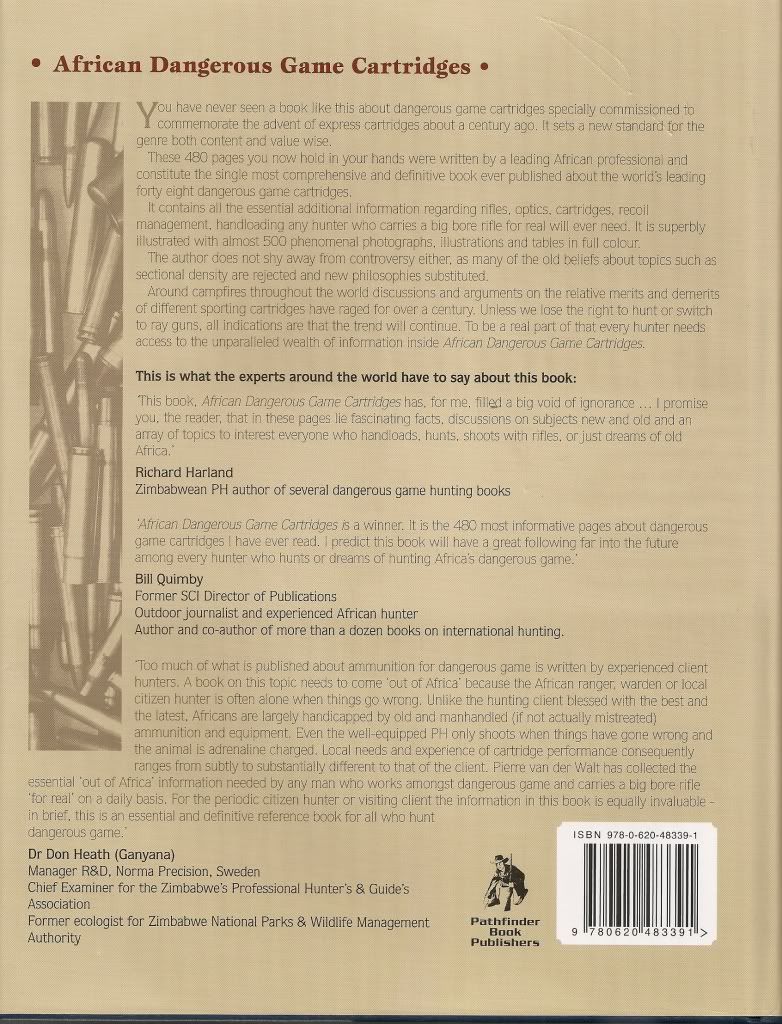 Read this: Americans started it, Germans improved it, and the Brits popularized the 3/8"-caliber cartridge. 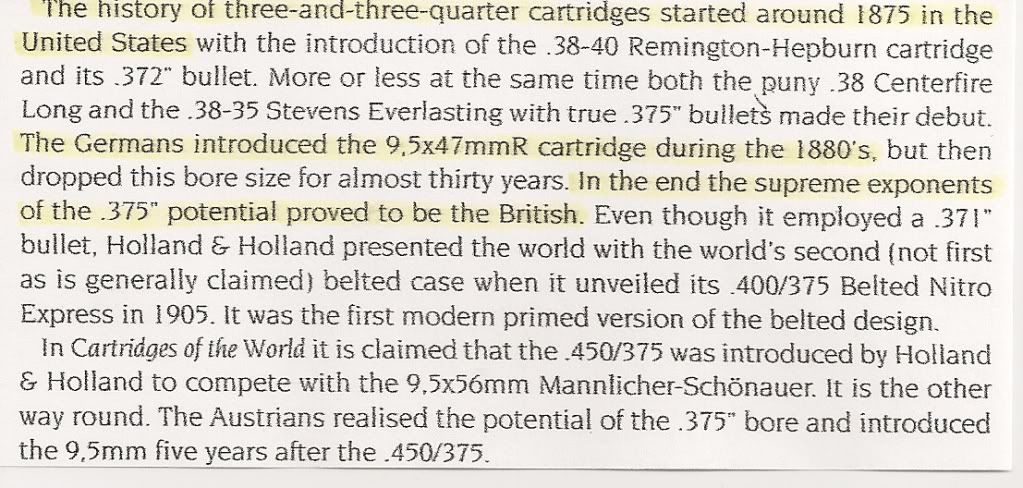 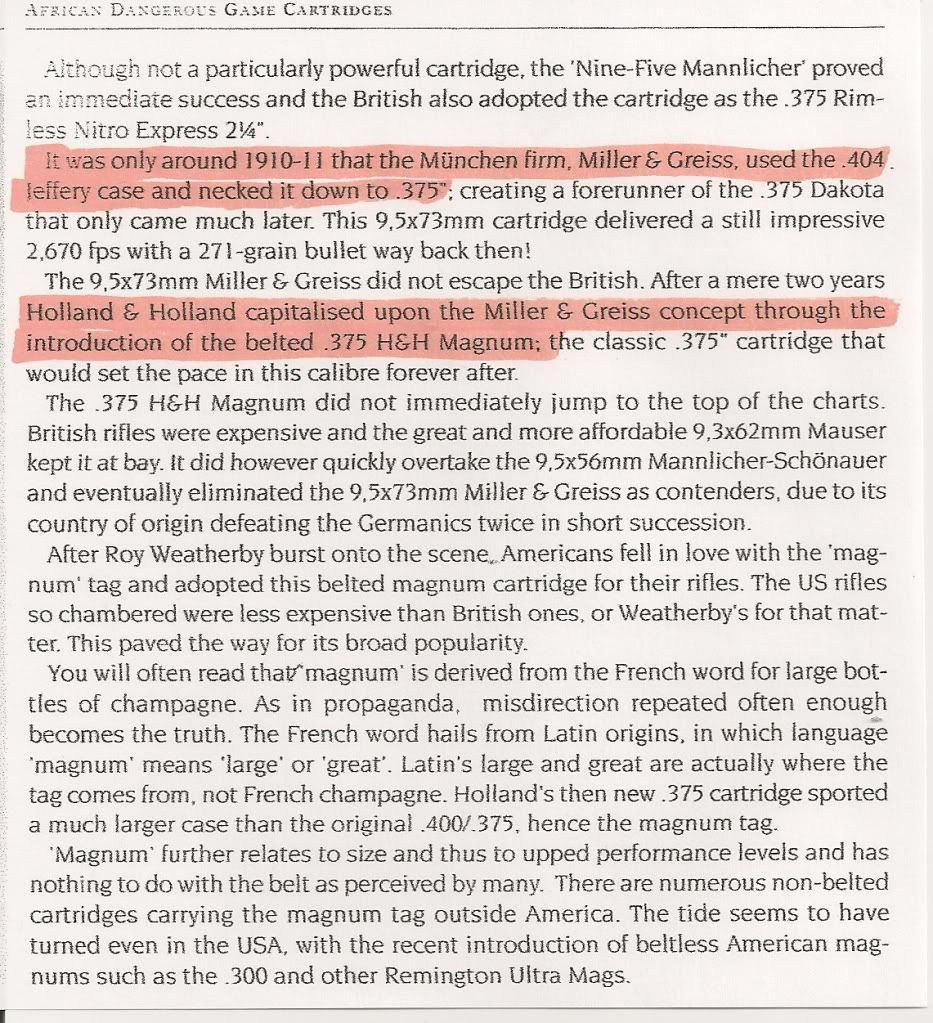 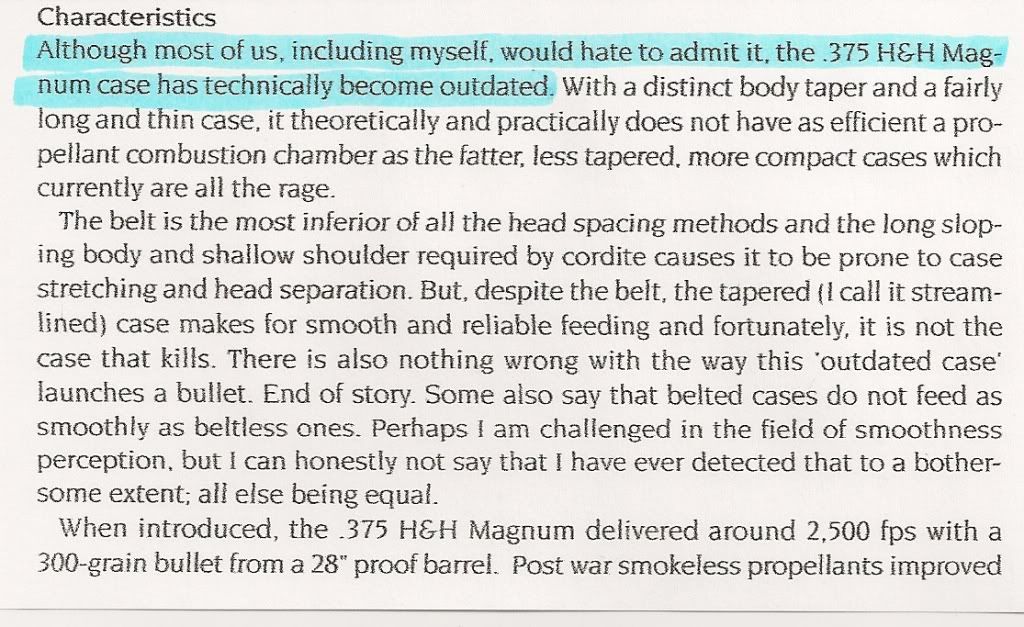 Alas, the belted case was also started by Americans in 1866. Thank goodness for the Germans! http://rtbltd.com/arch/cats/1203_01.pdf  ************************************************************************************************************************************************ Finally, in the centennial year of the .375 H&H, we have come full circle and have returned the son of the beheaded King of Cartridges to the throne. We have come full OUTER CIRCLE. The .375/404 Jeffery Saeed is that ultimate improvement of the over-100-years-old .375/404 Jeffery, the .375 Miller & Greiss Magnum, 9.5x73. It is released to the gun trade. Many thanks to Saeed for well over a decade of R&D and exhaustive field trials on the improved version of this 1910 cartridge. His original two rifles are simply called ".375/404 Jeffery" and were produced with a reamer made by Dan Green. Dwight Scott, legendary gunsmith and benchrest champion, was involved in its development with Saeed. Custom reloading dies were made for it by Redding, IIRC, and maybe another maker. Saeed has the original reamer, and the only specification known on that reamer is ".408 neck." No reamer drawing, nor cartridge drawing, with exact specs exists anymore, unless Dan Green or Redding are in possession of the information. My cartridge drawing comes from partial specs measured by Saeed himself, from his fired and resized brass. Hence this cartridge is designated the .375/404 Jeffery Saeed. This is a new standardization that Saeed himself might consider using, when he wears out his current barrels ...  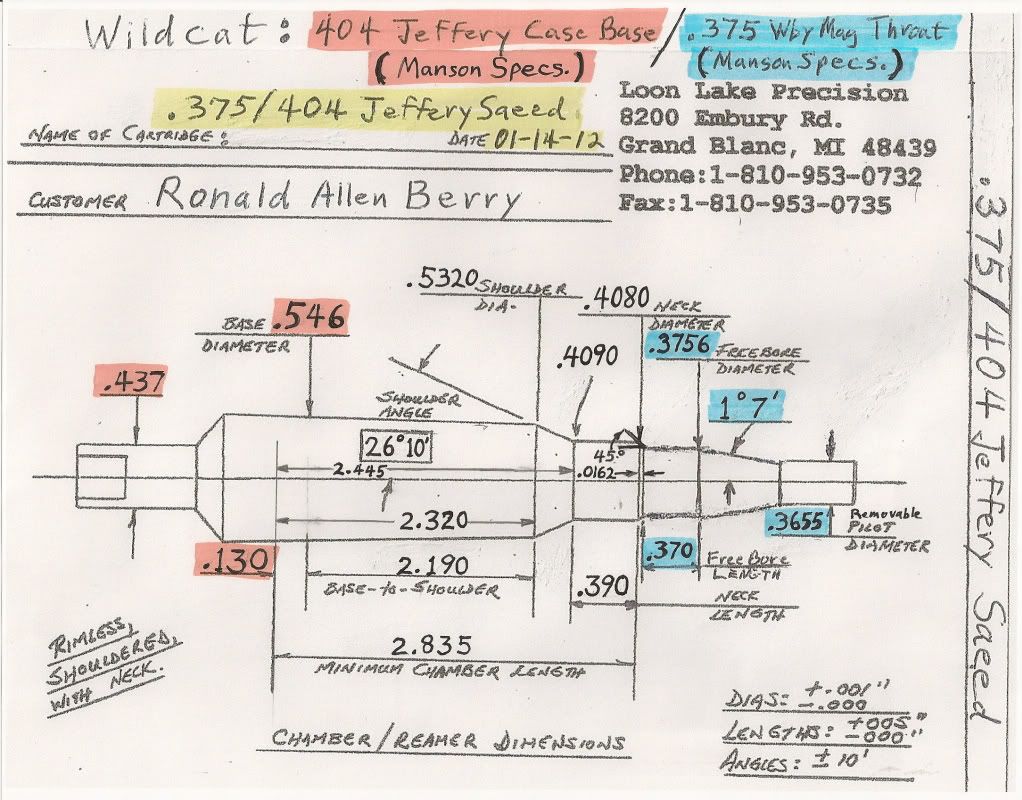 | ||
|
| one of us |
I see that folks are speechless after realizing that the .375 H&H is riding on the coattails of the older .375/404 Jeffery, according to the highly esteemed authority, Pierre van der Walt.   | |||
|
| one of us |
RIP: I do not believe your assertion on the age of the 9.5mm M&G to be correct? I will tell you my reasoning: The earliest M&G 9.5's wore the headstamp of DWM 555 and then cal 404 and not the later version as shown. The 555 is off course non other than DWM's cart number for the 404 and my sources would have it that DWM only started production of this cartridge circa 1926. That would mean that the 9.5 M&G thus headstamped had to be equal to or older than 1926 hence the common reference dates of 1926 up to 1928 commonly seen in sources regarding the age of this cartridge. DWM assigned case number 564 to the M&G 9.5 in 1928. Fred Datig's DWM list 1896 - 1956 has case number 564 and in his book Cartridges for collectors Vol 1 he has it under DWM number 473- C ? This number does not fit with any of the known DWM catalog numbers..... also though cases were stamped 9.5 Miller and greiss the faint 404 DWM stamp can be seen on the brass in some | |||
|
| one of us |
Alf my friend, Thank you for the reply. I too believed as you until I read the words of Pierre van der Walt, your countryman. Here is what I had access to before reading his authoritative book, AFRICAN DANGEROUS GAME CARTRIDGES: More on the 9.5x73mm Miller-Greiss Magnum ... From W. B. Dixon's EUROPEAN SPORTING CARTRIDGES:  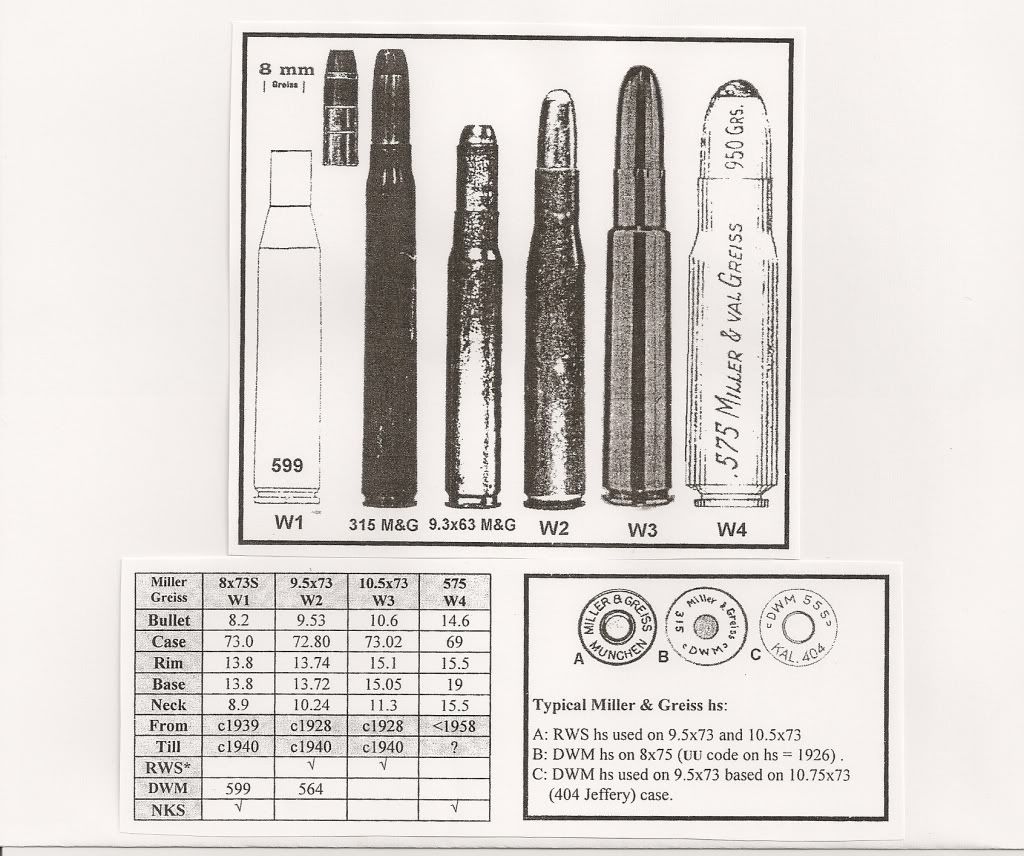 From Fred A. Datig's CARTRIDGES FOR COLLECTORS VOLUME 1 (CENTERFIRE):  From Frank C. Barnes'/Edited by Layne Simpson CARTRIDGES OF THE WORLD 12TH EDITION:  Datig did not even get the bullet diameter right!!! Miller and Greiss were in business as early as 1886 by documented reference to their DBA names. They were making a distinctive bullet type before 1910, in various calibers. The 404 Jeffery brass and rifles existed by 1905, and the design was conceived as early as 1904 by your own claim, thus the name of the plus-40-caliber, as the "40 of 1904," by your claim, or the "plus-40-caliber-4-shooter," by my claim, as the "404" Jeffery. It is not hard to imagine the Miller & Greiss duo wildcattig the .375/404 Jeffery as early as 1910. The fact that properly headstamped brass for it did not arrive until the 1920s is very likely, given the handicap of the German defeat in WWI, and the political correctness of the times gravitating against the Germans and for the British cartridges. We shall await Pierre van der Walt to help us out here. I think his timeline is much more plausible than yours. Even Saeed does not have properly headstamped brass for his improved version of the .375/404 Jeffery, And it is probably nigh on to 15 years since the cartridge was born, to Saeed. Maybe Saeed will tell us when he designed his version of the ".375/404 Jeffery." My specs for the ".375/404 Jeffery Saeed" are as similar as possible, given the information available. My only admitted change is to use the .375 Weatherby throat of Dave Manson on my reamer order. With that throat I shot a 0.138" 3-shot group at 100 yards, with the first three test shots of 78.0 grains of RL-15 powder, using a John Bridger copy of the 300-grain Walterhog bullet that chronographed at 2717 fps, in a .375 Weatherby. I picked several spots on the 100-yard target to get many test loads on one piece of paper for convenience. Scope was the proverbial Leupold 2.5X-8X VXIII set at 8X: 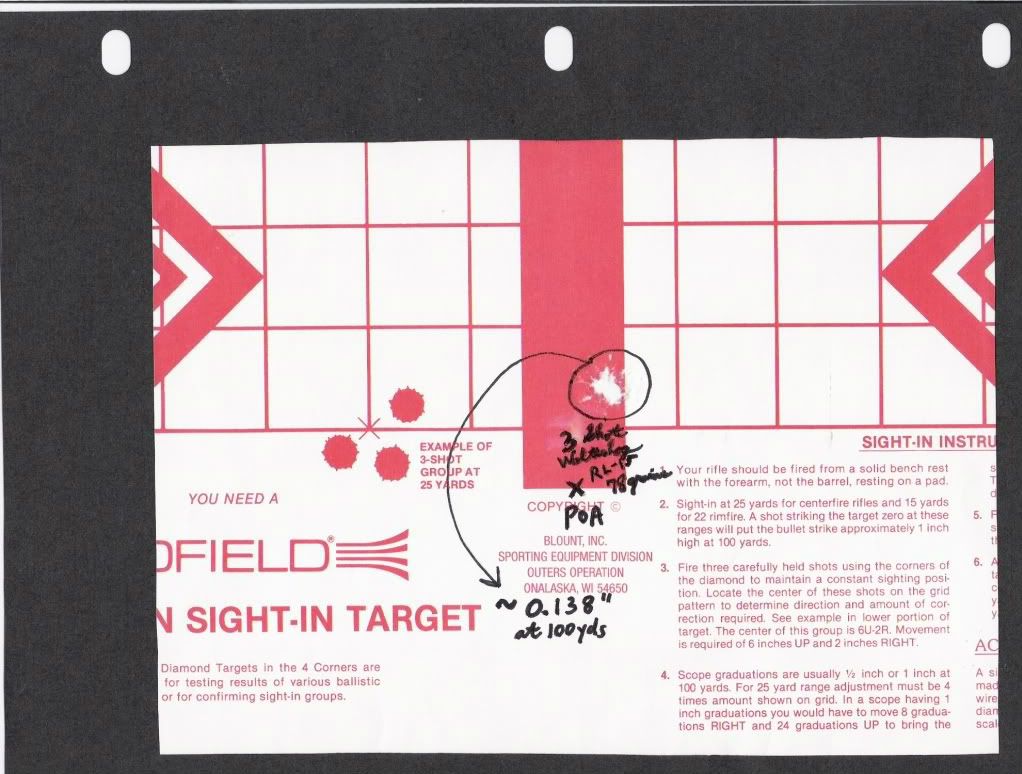 Input from Pierre would be appreciated: References to dates on the Miller & Greiss cartridge. Input from Saeed would be appreciated: Date of his cartridge design in the 1990s. | |||
|
| one of us |
RIP: Though the book you cite is an excellent compilation of cartridges , well presented etc, I do not believe the all data cited to be representative of own research or necessarily valid. At least Brad Dixon's work is based on research of the available and known catalogs put out over the years and Fred Datig's work a direct collaboration with IWK after the DWM demise. As to the timeline of the German proprietary "magnum" era it all happened in the 20's up to WW2. All of the German high velocity contenders came from this time. | |||
|
| One of Us |
I have a barrel off a 9,5 M&G. The rifle was re-barrreled to .404 sometime in the 1920's and the barrel is in pretty good shape. I have often wondered what to do with it! The fact that my grandfather re-barreled the rifle in the 20's, and being Scots I doubt he bought the rifle new, it would sugest to me that the 9,5M&G was in circulation in Africa by the ealy 20's at the latest. | |||
|
| one of us |
Ganyana: Up to 1926 Mauser used Brit Cordite loaded ammo to regulate and shoot the 404's they built for Jeffery and the British trade. These cases had Large Cap Primers ! It is only after 1926 that we see DWM producing the 404 as we have it now and all of the specimens of the 9.5 M&G, 3 different HS's in all are based on the post 1926 404 Jeffery case. | |||
|
| one of us |
Ganyana, Hang onto that barrel! It is an important piece of history. It needs to be in a museum if not in my hot little hands! Alf, A cartridge can exist long before it has properly headstamped brass for it. The Miller & Greiss Duo were knocking around from the 1880s on into the 1930s. 404 Jeffery brass was available by 1905. .375 caliber bullets go back to the 1870s in the USA. You have nothing to disprove Pierre's statements on the timeline. It would be nice to know where he got his information. It would also be nice to know what year Saeed's improved version of the aged .375/404 Jeffery came to daylight in the 1990s. We do not know a date/year for something as nonobscure and recent as that, and there is no properly headstamped brass for that one either, yet. Lessee, Miller and Greiss dreamed it up sometime after 1905, built it in 1910-1911, and finally got their properly headstamped brass in 1926-1928. Yep, I would say Saeed is doing at least as well as they did in rushing headstamped brass into production. | |||
|
| one of us |
375/404JS reamer is under construction, delivery in "six to ten weeks." For the 1910 wildcatter, was there really any concern about headstamp matching barrel stamping/engraving? Surely even less than there is now, no CIP, no SAAMI, no corrupt ex-colony inspectors looking for bribes at the airport from the tourist hunter ... And here we are a century later recreating the wheel, copying Saeed's improved version from what, 15 years ago? Gunnutts a century ago, gunnutts now ... | |||
|
| one of us |
Josef Miller died in 1912 and Val Greiss in 1890, what was left was their company and that closed during WW 2. The timeline of their famous cartridges of this era runs from +/- 1928 for the 9.5 and the 10.5 ( which is their offering of the 416 Rigby) the 8mm of 1939, the 315 M&G which is actually not a original , it is the 8x75 Behr which was made by DWM in 1926 and then the case that bears their name in the form of the 575 which was never made by them ( no original specimens exist only drawings but later made by OPM in South Africa. May of the specimens of the 9.5 shown in pictures are in fact the modern offering by OPM. As to the timeline, it coincides with the Vom Hofe offerings as well as the Brenecke and RWS fast lineup of cartridges. The devil is in the detaiile. Show me a DWM headstamp of a 9.5 that preceeds H&H's 375 and I will buy your theory. Up to now the earliest Headstamp on a 9.5 case is UU of a 404 Jeffery case by DWM and that is 1926 . Also remember and this is important DWM only started making sporting ammo in 1920 and the earlisiest sporting HS's were from ?1921 or possibly 1922. Lets argue then that the 9.5 was before the 375 H&H, who then could have made cases in Germany ? Geco ( Gustav Genshow) they have no listing for this cartridge DAG ? they made only powder and primers up to 1925 then only ammo RWS ? nope they started sporting production in 1925 GC Dornheim: No they did not make this round MWS ? no they made mil ammo only and shotshells Egestorff Linden; Also not. So the only cases could have been Eley out of Britain and later Kynoch, but as I have said their primers were large cap primers used for Cordite. and up to 1926, then only do we see Flake powders in the 404. If i can say one thing about the Germans, they were sticklers for detaille ! they cataloged and properly documented each and every step in manufacture and upheld rules of proof, even late into the war. You did not simply at random produce "wildcats" and market them in Germany, not at that time, all and everything produced was done properly and to a set order. Their gunmakers went by title, something you still see today. | |||
|
| one of us |
| |||
|
| one of us |
| |||
|
| one of us |
| |||
|
| one of us |
| |||
|
| one of us |
ALF preserved, before it vanishes ... | |||
|
| one of us |
RIP: Here is a theory of mine and I back it up with dates and timeline. The "golden era" of modern German cartridge design runs from circa 1925 to 1939. ( go and look em up, all of the "German beltless magnums" come from this era) Why do I claim this ? Simply because it is the time when most of the big name cartrdige and brass manufacturers of that time opened their factories to making non military and sporting cartridges. By now they had done some amalgamation, some old timers were swept up under new umbrellas and only a few big names remained. My understanding is that DWM for instance would only make cases for sporting pusposes if it meant a run of at least 200,000 pieces. Also that unlike the USA Germany was bound by law under Rules of Proof so that all commercial production of what could be seen as Wildcats had to go through testing and proofing. We see in this time a production of what could be termed "Beltless metric magnums" by the Germans. By now the original big names were dead, however their companies lived on. We see collaberation between the big names so that it becomes unclear who actually in person designed what and when. Brennecke, Schuler and others share data and honours..... what is interesting is that a cartridge like the 8x68 was attributed to Schuler ? However there is no credible evidence to back this up. What we do have is the name Lampell-Furth ( spelling?) of RWS who is claimed to be the designer. The really sad part in this history is that WW2 intervenes and puts a stop to it all ! I often wonder where Germany would have been if they did not drag everyone off to a stupid war. Just imagine what wonders would have awaited us. Mausers built on truelly great calibers and cartridges ! | |||
|
| one of us |
Another good one from ALF:
| |||
|
| one of us |
So we have some idea of when the properly head stamped brass for the 9.5 M&G arrived, but no idea of when the .375/404 Jeffery was first wildcatted, other than, necessarily, no earlier than 1905. I wonder where Pierre van der Walt is getting his idea of 1910 to 1911, pre-dating the .375 H&H? | |||
|
| one of us |
Shrouded in the fog of history, records impairment by WWI and WWII, the Germanic .375/404 Jeffery date of origin is what? Just guessing the origin year of the improved version by Saeed: 1997? Yet in 2012 no properly headstamped brass. In 2010 in Tanzania, some field photos and field measurements, respectively, of the cartridge and the Walterhog hollowpoint depth and width: Cartridge, as loaded by Saeed: 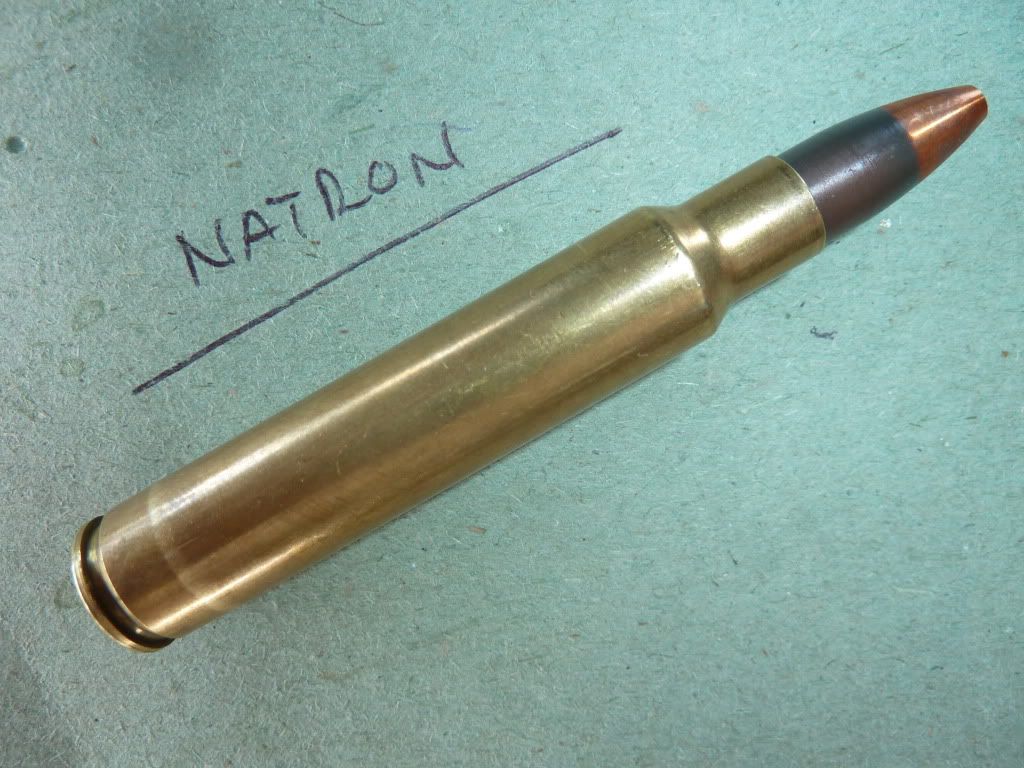 The hollwpoint depth on the wooden toothpick, the hollowpoint width on the Swiss Army Knife toohpick: 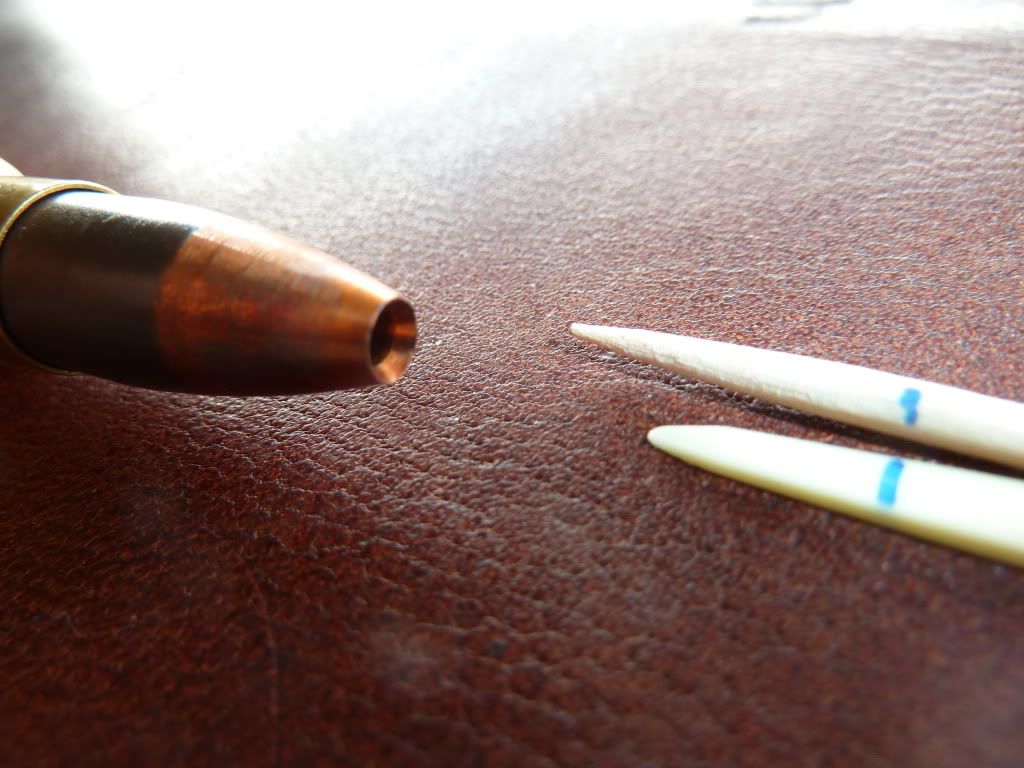 Bullet weight: 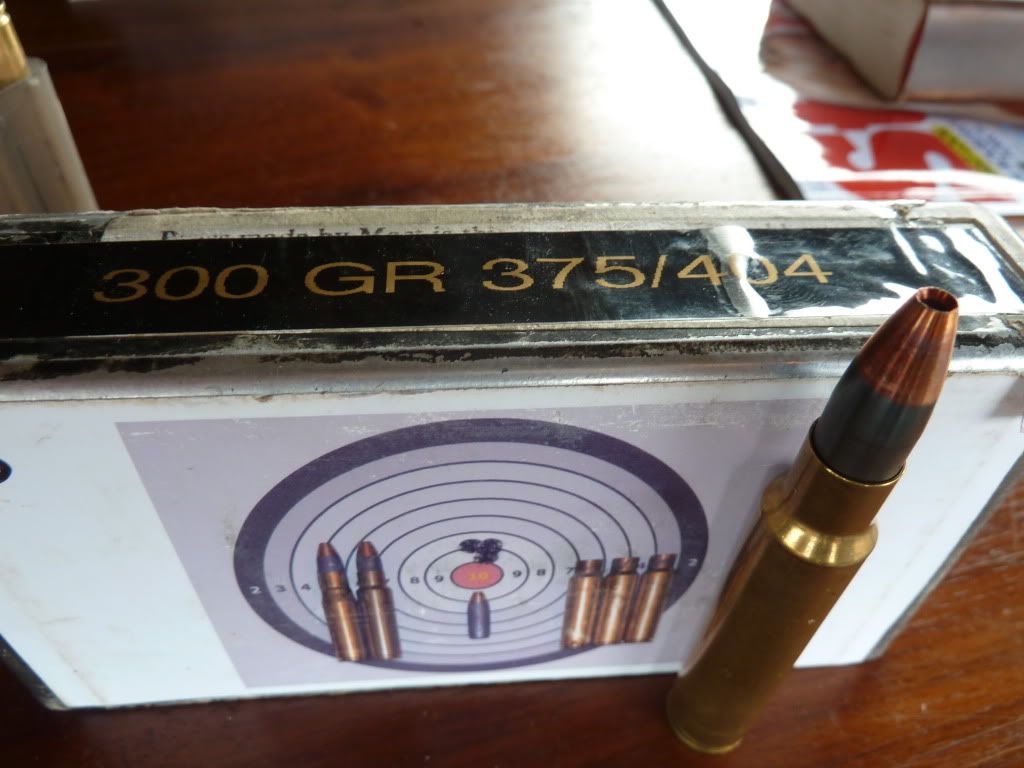 Recovered bullet from a one-shot-dead buffalo? 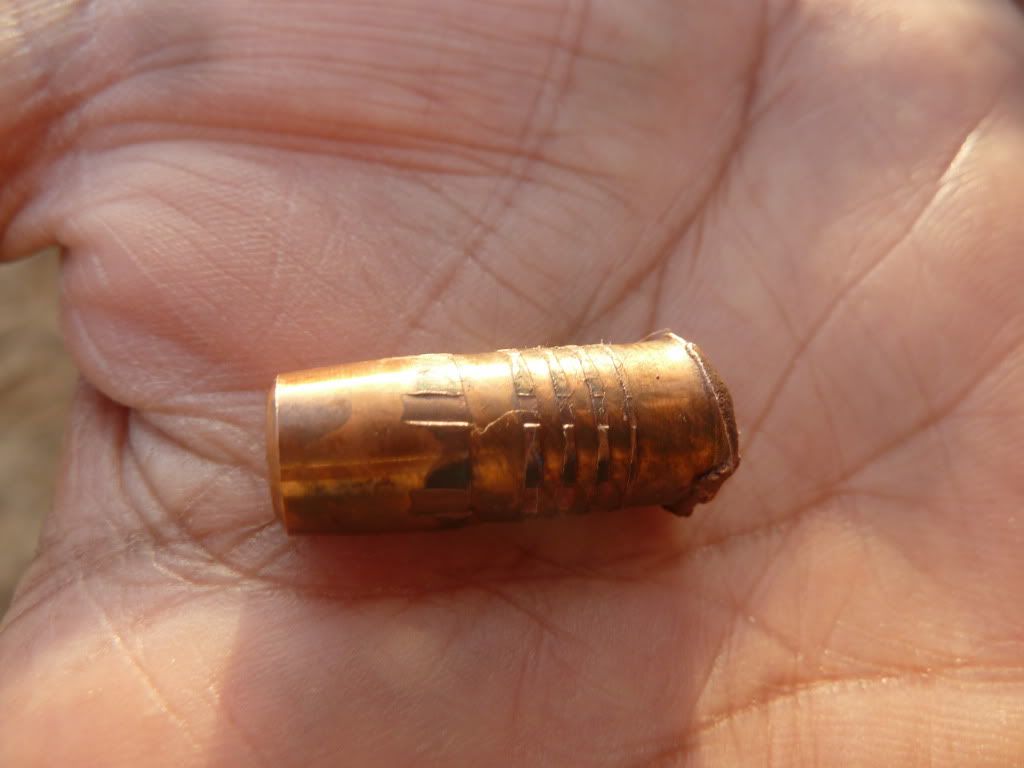 | |||
|
| one of us |
Year of origin (2012) and specifications are certain for this one: ".375/404 Jeffery Saeed" On the centennial of the .375 H&H, something better, something not top secret. | |||
|
| One of Us |
RIP, Can't help but laugh but do you think when Saeed is dead and gone there will be those who think his first name was Jeffery? ROYAL KAFUE LTD Email - kafueroyal@gmail.com Tel/Whatsapp (00260) 975315144 Instagram - kafueroyal | |||
|
| one of us |
fairgame, Thanks for livening up this otherwise serious discussion with a bit of drollery. Always appreciate the comic relief. | |||
|
| One of Us |
RIP, How different is the 375/404 and the 375 Dakota? Aren't some of the Dakota calibers based off the 404 Jeffery? I'm just a little curious. Go Duke!! | |||
|
| one of us |
Texas Blue Devil, I will have to limit my answer to your question to the ".375/404 Jeffery Saeed" as that is the only "375/404" with specs known for certain, by me, or anyone else I know of willing to confess. "Saeed's .375/404 Jeffery" is very similar to the ".375/404 Jeffery Saeed." The .375 Dakota has brass length of 2.570" and COL of 3.430". The .375/404 JS has brass length of 2.820" and COL of 3.750" with Walterhogs or 3.600" with "normal" bullets, of shorter nose length. The .375 Dakota is very similar otherwise. Just sawed off in the body length. In fact, thanks for reminding me to order some .375 Dakota dies to use on the neck and shoulder area of properly sized 404 Jeffery brass, for the initial fireforming. Like using .458 WinMag dies to load for a .458 Lott. Yep, all of the Dakota proprietary cartridges are based on 404 Jeffery basic, except for the 450 Dakota which is closer to .416 Rigby basis. 450 Dakota is slightly smaller in base (.582") and rim diameter (.582") than the .416 Rigby, which may have max specs of .589" and .590" respectively, on the base and rim diameters, though actual brass as made is usually about .004" smaller. | |||
|
| one of us |
Yep, the specs of the original "Saeed's .375/404 Jeffery" (leaned against the tree below) are very close to those of the ".375/404 Jeffery Saeed" of 2012. It is as close as possible working from the available data resting on the dead buffalo below. Just for some more drollery, we might call it the "375-2012" sort of like the "30-06." 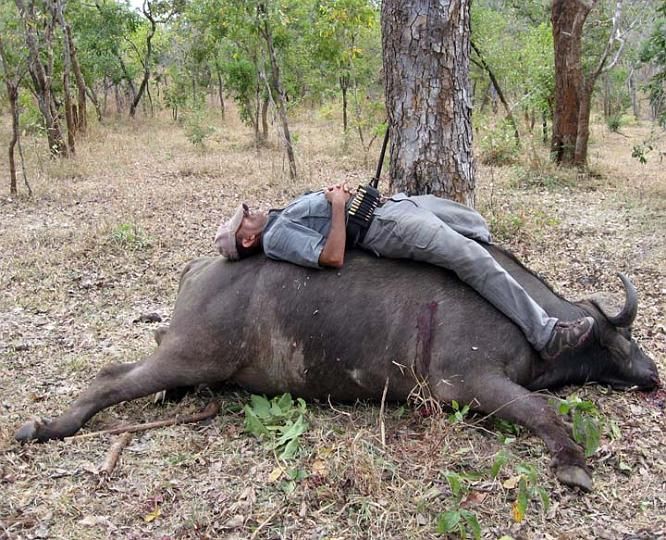 | |||
|
| Moderator |
Still subscribed. | |||
|
| One of Us |
"It would be nice to know where he got his information." Usually, for a book, and especially a book about a technical/historical subject such as Pierre's book, to be called "authorative", it needs to contain a bibliography or some sort of reference to sources. There's no such thing in my copy of the book, and neither do I presume there's one in all the other copies of it sold worldwide as well. We are thus left to wonder about the sources for much of the information contained in the book. Inter alia, Pierre makes a couple of statements about the old English NE cartridges that had me scratching my head, and I would dearly have loved to be able to check his sources. Not saying he's wrong, but he left us hanging in the air in many instances and that greatly dimishes the book's claim to any authoritiveness, in my humble opinion. Like Jack O'Connor once famously said, "Pick your expert". | |||
|
| one of us |
"Semper Fi Chris," yep, I know you are. The able Clyde Moore was minding the shop while Dave Manson was gone to Shot Show when I ordered the reamers and gages: Removable pilot roughing reamer and removeable pilot finish reamer, go and no-go gages. Expected delivery 6 to 10 weeks from 1-18-2012. Maybe by The Ides of March. I have gotten reamers from Manson as quick as 4 weeks, no later than 6 weeks in the past. Here is the action that is going to be the first ever 375-2012, aka .375/404 Jeffery Saeed: 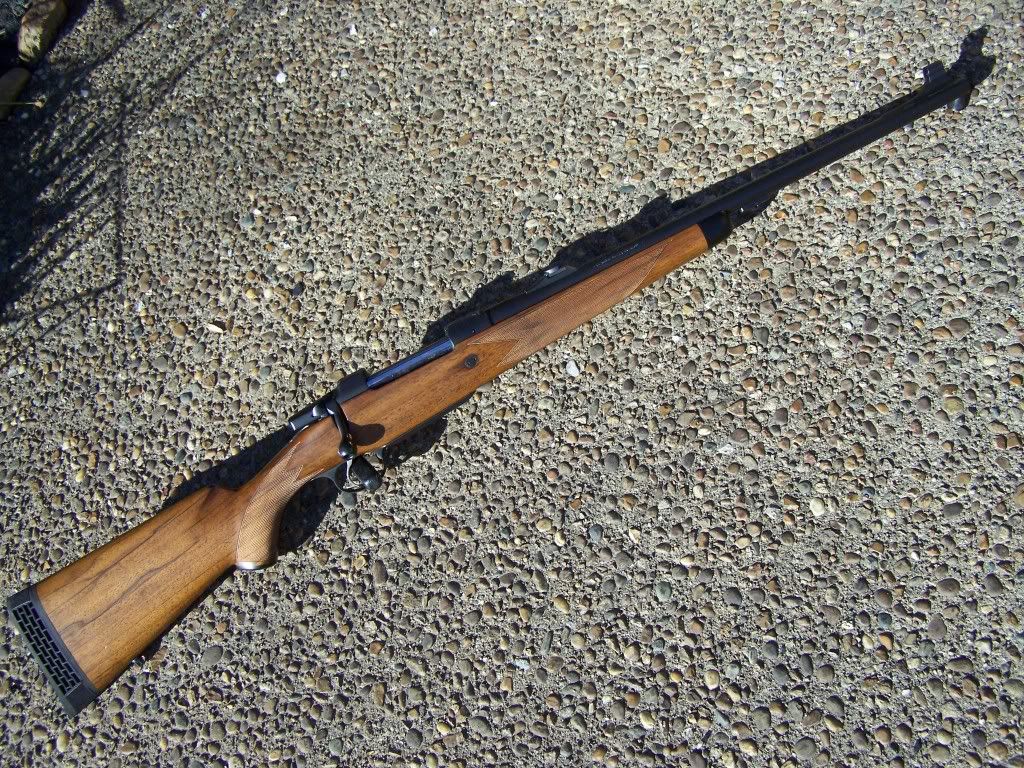 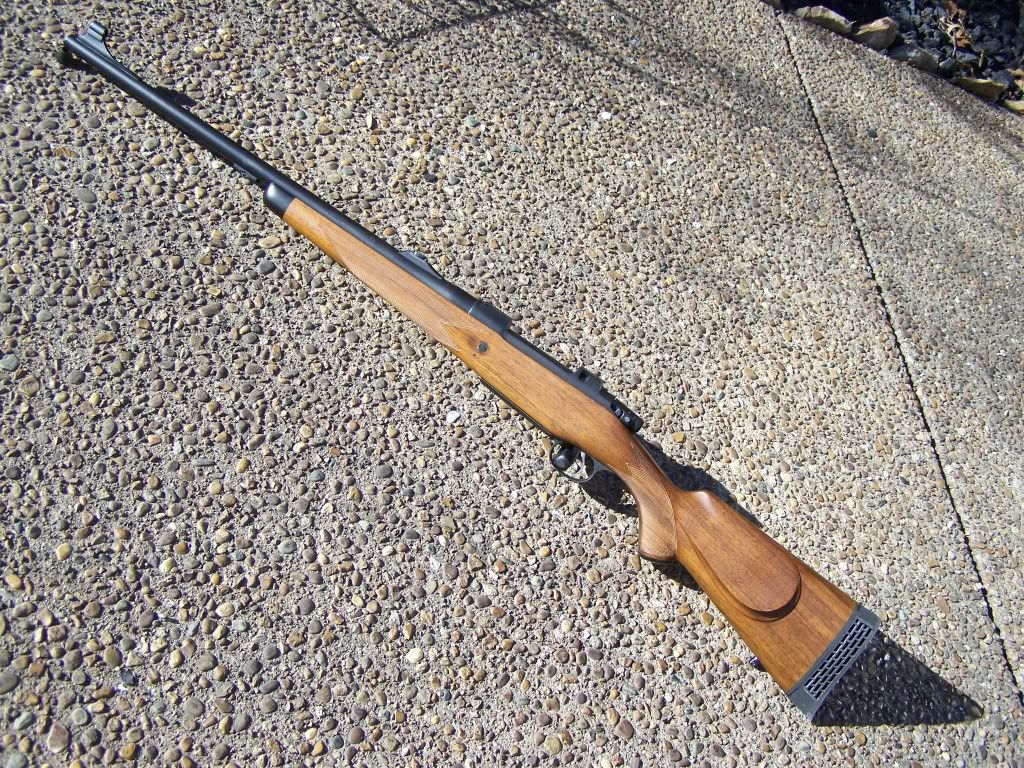 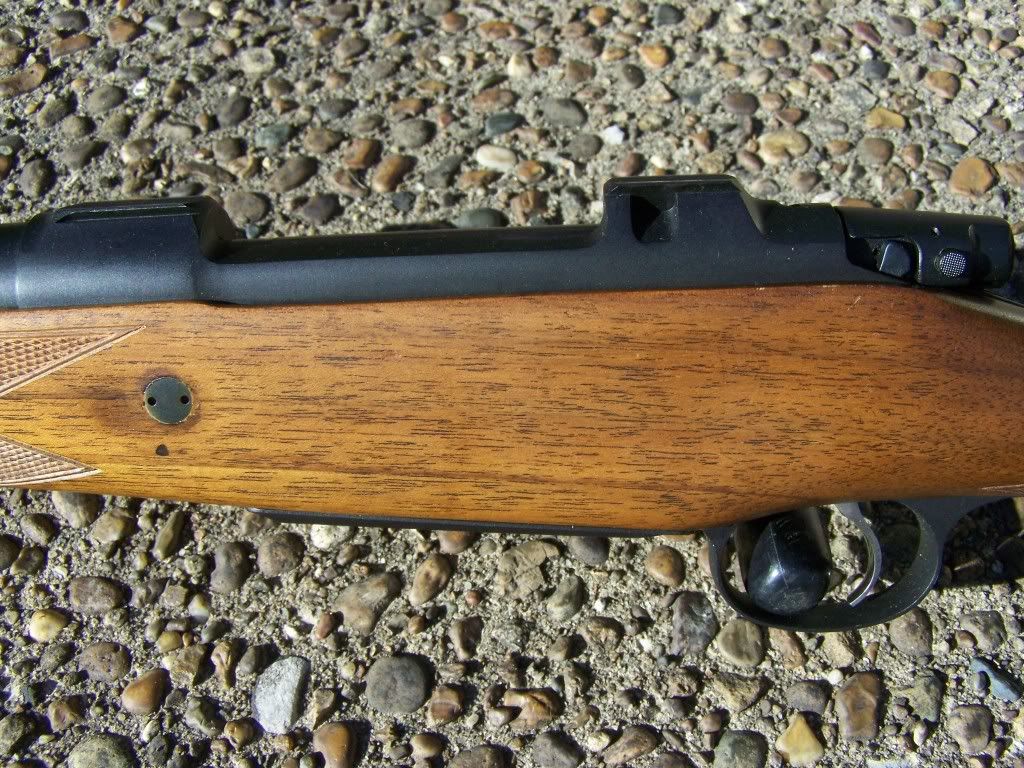 The "H&H" was ground off and replaced by "RUM" by a competent engraver: 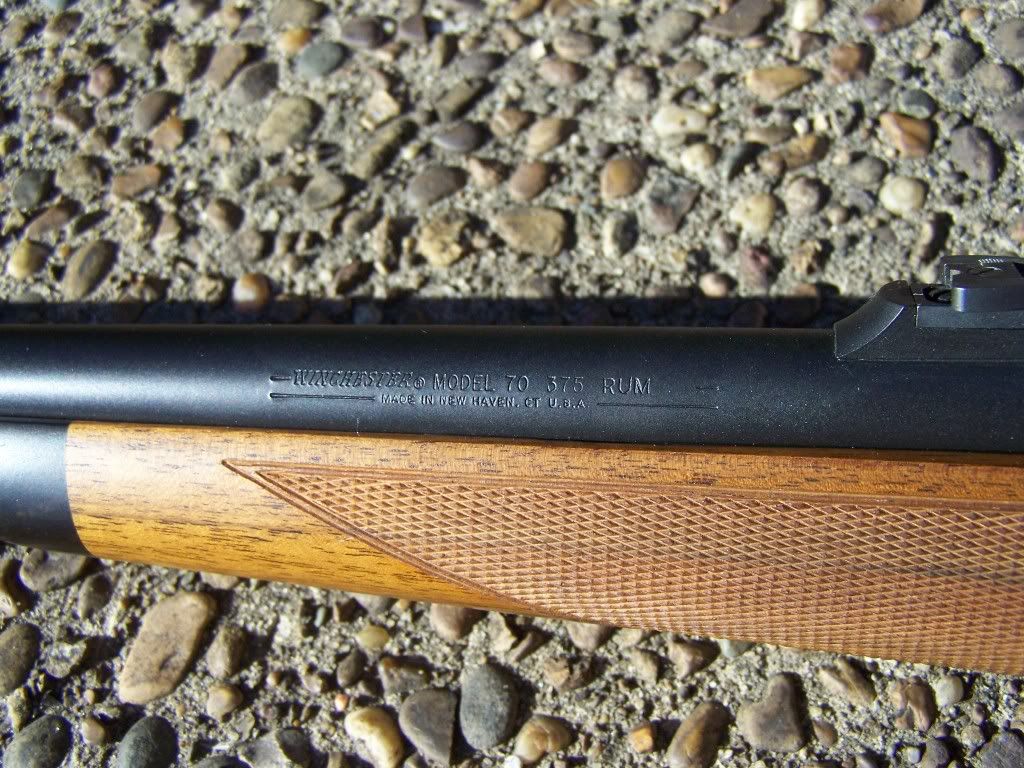 This is an action I found in the glass counter shelf under the cash register of Great Northern Guns in Anchorage, AK about 1994. It is a CZ 550 Magnum that has no billboard stamping on the left side, but there is an "AHR" serial number below the woodline on the left side of the action: AHRX0001 Interesting serial number. This rifle is currently a .375 RUM that used a take-off Winchester M70 Classic barrel in .375 H&H. It was cut off at the breech, re-threaded and chambered to .375 RUM, ending up 23" barrel. It has a Dakota M76 African follower and spring. It has been polished supremely inside the box, feed rails, and ramp. It works great as a .375 RUM. It will work even better as a 375-2012: Parts is parts: Dan Lilja No.6 sporter stainless fluted to finish out at 26" length, 1:12" twist, of course. McMillan stock if the No. 6 barrel won't fit in a CZ Kevlar stock by B&C. Ed LaPour 3-pos. M70-style "wing" safety. Timney trigger. And I have a Plus-One floor plate made by Wisner, obtained from member G.Hansen, that I might add on ...  ... if it does not go onto a 500 Mbogo or .395 Tatanka. Just adds about 0.1" of depth to the box. But that could make the 4-down into a 5-down, thus a "Six-Shooter" 375-2012: That is not a telephone number. Needs the international dialing code and area code yet ... | |||
|
| one of us |
jvw375, Thank you for the thoughtful post. A beleaguered Pierre would have to be working on the next 3 volumes of the current book just to get in all the references. I was also hoping for a few pages on the .395-caliber 400 Nitro For Black Powder 3-Inch, and how it lapsed into obsolescence, never fully realizing its potential, never making the transition to 400/.395 Nitro Express, until 2007. But it is still surely the greatest book on the subject of African DG Cartridges. Puts all others related to it to shame. Instead we depend upon Pierre's gestalt here at the gesellschaft known as accuratereloading.com. I ges. | |||
|
| One of Us |
You've picked your expert, then. To each his own. | |||
|
| one of us |
No man, you got that wrong. I am my own expert. I just said Pierre's book was the best yet, not that he was my pick for "The Expert." One thing is for certain about who "The Expert" is for one cartridge in particular, for African Dangerous Game, or any game. Regarding the ".375/404 Jeffery Saeed of 2012" aka .375-2012, I am "The Expert." With two rifles chambered for one cartridge like the .375-2012, who needs anything more? There will be no historical uncertainties, unless we have another World War and I and my records get wiped out. | |||
|
| one of us |
I think that the .400 TEMBO is a better chooise | |||
|
| one of us |
Why? So you can shoot pistol bullets with it when squirrel hunting? Might as well stick to the 404 Jeffery rather than a .400 Tembo, which is a .400/404 Jeffery. The .400 is handicapped in comparison to the .375/404Jeffery Saeed due to bullet availability, worlds better with the latter. We of the .395 family are able to size those same pistol bullets down to .395 (10.03 mm) easily enough. But that makes us no better than the .400-caliber. Even the mighty .395-caliber rifles suffer in versatility when compared to the .375/404 JS. I made a mistake when submitting a neck diameter of 0.404" maximum for the ammoguide brass drawing early last month, doodling before I finalized on .405". The drawing finally got listed at www.ammoguide.com demo here: http://ammoguide.com/?catid=836 The 836th cartridge listed there. There is a link to this ar.com thread on the detail page. I will see if Mike Haas will let me correct my 0.001" error on the brass. That error also changed the shoulder angle from 26-degrees-35' to 27-degrees. We must not have any inconsistencies in the lore of the .375/404 Jeffery Saeed. Load data to be added. 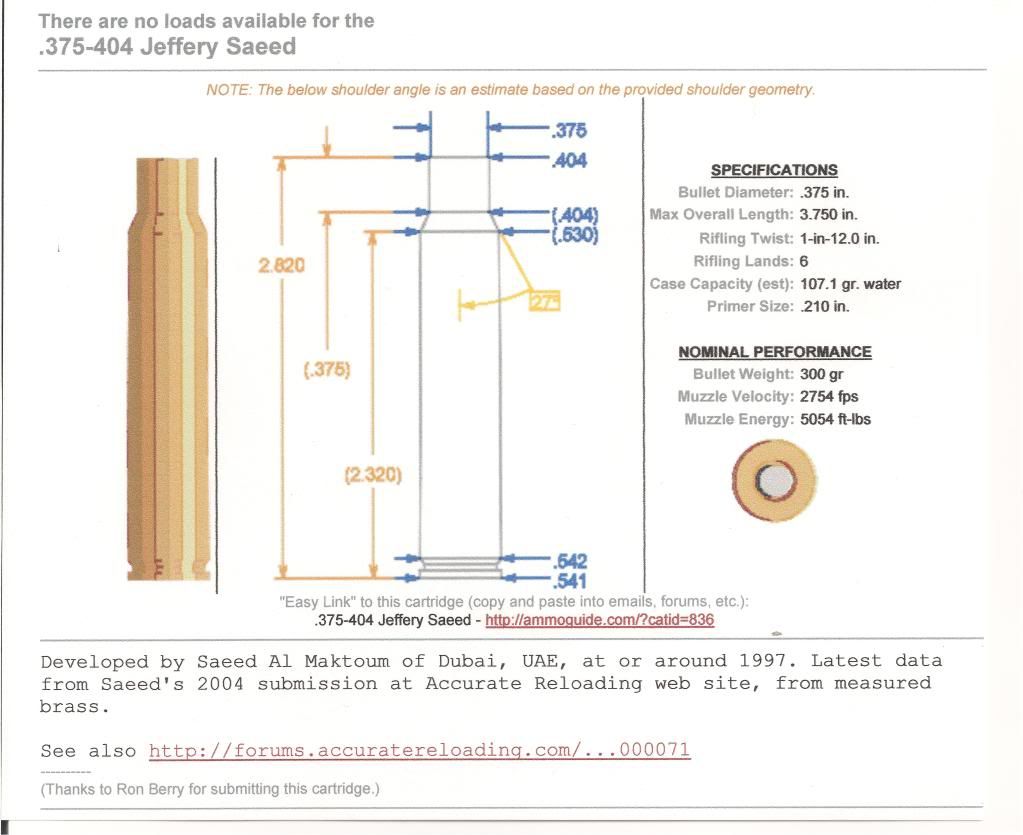 Regarding ammoguide gross water capacities: they are calculated numbers, not real. They are good for comparing the relative sizes between various cartridges, as all are calculated using an ammoguide algorithm based on external brass measures. The .375/404 JS is 20% bigger than the .375 H&H, and 10% bigger than the .375 Wby. The .375/404 JS will do maximum .375 Wby external ballistics, with pressures about 10% lower in the .375/404 JS. | |||
|
| one of us |
Has that first .375/404 Jeffery of Saeed's been rebarreled? Could it be that the first .375/404 Jeffery of Saeed did not use a fluted barrel? Latest barrel specs unearthed at the digs: Shilen 23" with .780" diameter muzzle and 6 flutes. Lilja 26" with .760" diameter muzzle and 6 flutes. But this fuzzy picture does not look like it shows a fluted barrel, or maybe it does:  (From Saeed's Photo Gallery, Rifle Collection, Page 18.) "This is my favourite rifle. It is based on a Dakota 76 action, and chambered for our own wildcat, the 375/404. It has a 23" barrel and a Leupold 2.5-8 scope." ... Last updated August 18th, 2000 ... So, the picture had to be from no later than 18 Aug 2000. Judging by the wear on the stock, a painted McMillan I presume, and guessing at the logistics of getting Saeed, Dwight Scott, and Dan Green onto a collision in time, 1997 might be the year of conception/origin of the cartridge, then rifle. As self-appointed "archeologist" of the .375/404 Jeffery, I am still digging after ten years ... A standard M98 Mauser (FN) with 23" non-fluted barrel is also planned, for the 2012 celebration of the "best" .375. | |||
|
| One of Us |
Didn't Roy Weatherby use the 400/375 case for his .244 Weatherby magnum? | |||
|
| Moderator |
Here it is ca 2009... I think the only modification was the sleeve over the muzzle brake... 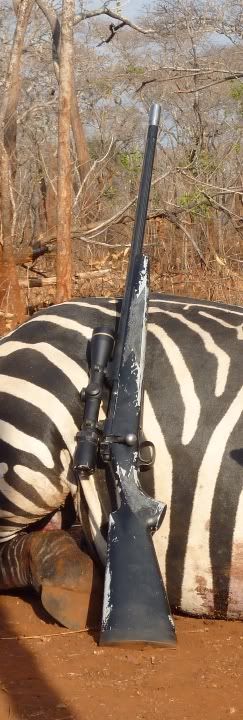 You can make out the flutes though, and it does appear that it may have been re-blued. | |||
|
| Moderator |
Here is a pic of it in 2006....Don_G is applying the wet towel to cool it off during Saeed's "Dwight Scott Selous Classic" shooting competition...looking much the same is it did later in 2009, with the exception of having a little more paint left on the stock. 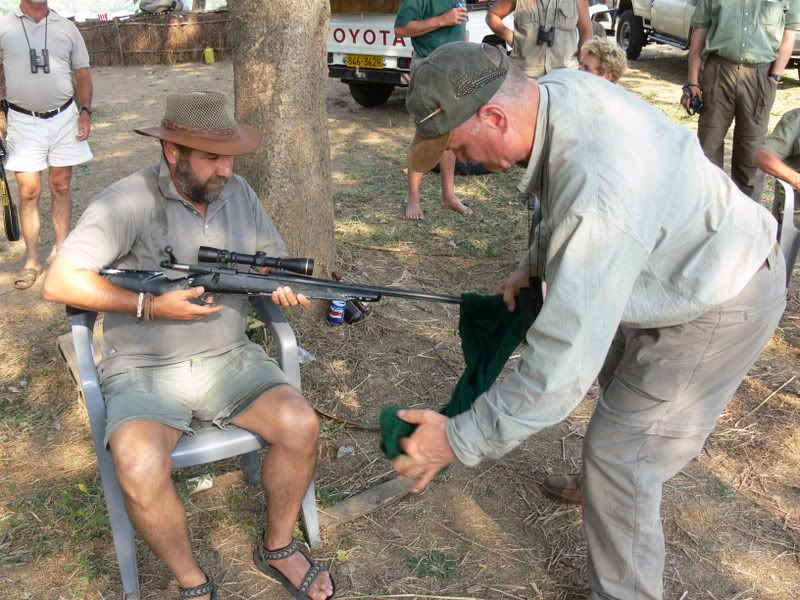 | |||
|
| One of Us |
1. My research indicates the 9,5x73mm M&G as introduced around 1927-28 although there may be earlier versions not loaded with mass produced ammo. I am therefore going with Alf on this one. 2. That reference in my book about the 9,5x73 predating the .375 H&H does not support my own research. There are a number of typos in the book which will be corrected in the 2nd print run and I am sure some will remain. It is just the nature of writing this kind of book that cannot be readily edited, especially in reasonable time. 3. Perhaps Ganyana's barrel marks will shed some light. I will talk to the man. 4. Books are bound in multiple of 16 page sections. 1-2 pages can be tipped in, but adding a 6 page bibliography to make the book worthy of some commentators would have required an additional 16-page section that would have added over US$ 5.00 to the price of the book once all the shipping, duties, taxes and final posting had been incorporated. The decision was made to rather publish a book unworthy to some (as is case with recent comparable books) than unaffordable to most. Pierre van der Walt | |||
|
| One of Us |
Pierre, the book is a great read. The caliber-versus-gunweight and the practicality of a double rifle in today's hunting brought some unbiased logic into the decision process on rifle selection. | |||
|
| One of Us |
Thanks for the kind words Biebs. It is a great relief that the book has been so well received warts and all. I hope it helps hunters and also to clarify erroneous facts through discussions such as this. There are hundreds of experts out there which can contribute to improving the knowledge going around and through that hopefully also the book via the kind of contructive criticism above. At least we have a fresh current state of the art based peg the ground from which we can improve. Pierre van der Walt | |||
|
| Powered by Social Strata | Page 1 2 |
| Please Wait. Your request is being processed... |
|
 The Accurate Reloading Forums
The Accurate Reloading Forums  THE ACCURATE RELOADING.COM FORUMS
THE ACCURATE RELOADING.COM FORUMS  Hunting
Hunting  African Big Game Hunting
African Big Game Hunting  AFRICAN DG CARTRIDGES: The .375 H&H came after the forerunner .375/404 Jeffery
AFRICAN DG CARTRIDGES: The .375 H&H came after the forerunner .375/404 Jeffery

Visit our on-line store for AR Memorabilia

